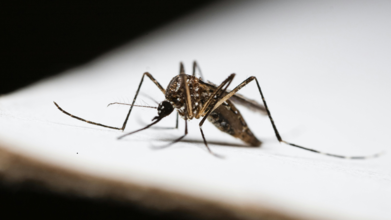- Health Conditions A-Z
- Health & Wellness
- Nutrition
- Fitness
- Health News
- Ayurveda
- Videos
- Medicine A-Z
- Parenting
- Web Stories
Unvaccinated Child Dies As Measles Outbreak Spreads In West Texas- How To Keep Children Safe?

Image Credit: Canva
The measles outbreak in Texas, US has reported the death of one child, the first reported fatality from the disease in the United States in almost a decade. The child from West Texas died in a hospital after contracting measles and was unvaccinated. The outbreak, which began late February, has now reached more than 160 reported cases in nine rural West Texas counties, the largest in the state in almost 30 years. Some cases have also been reported in eastern New Mexico, including four in children.
The fact that the infections are concentrated in certain communities, specifically among the Mennonite community, has caused alarm over the low vaccination rates being responsible for spreading the disease at such a rapid rate.
The Governor of Texas, Greg Abbott, has offered his condolences to the deceased child's family but assured the public that state health officials, epidemiologists, and immunization teams are working diligently to control the outbreak. The Texas Department of State Health Services and the U.S. Centers for Disease Control and Prevention (CDC) have been tracking the cases closely, offering technical support, laboratory capacity, and vaccine supplies to the involved areas.
Role of Declining Vaccination Rates
Declining vaccination coverage is one of the major reasons for the comeback of measles in the U.S. Since the COVID-19 pandemic, vaccination coverage has fallen below the 95% level necessary to sustain herd immunity in most states. Texas has witnessed a growing number of school-aged children avoiding vaccinations. Gaines County, which has the largest number of cases, has the second-highest opt-out rate in the state and has nearly 14% of its K-12 students forgoing at least one mandated vaccine during the 2023-24 school year.
The measles, mumps, and rubella (MMR) vaccine is very effective at preventing measles, but vaccine hesitancy and misinformation have led to decreased immunization coverage. The American Academy of Pediatrics has reaffirmed that the vast majority of children who get measles are either unvaccinated or not old enough to have received the vaccine, emphasizing the urgent need for public health measures.
What are the Possible Complications of Measles?
Measles is a highly infectious respiratory virus transmitted by airborne route. The virus remains active in the air for a maximum of two hours, and a patient can infect 9 out of 10 unvaccinated individuals within close contact. Symptoms are usually high fever, cough, watery eyes, and a rash, but the disease can result in serious complications like pneumonia, neurological damage, blindness, brain swelling, and even death.
In pregnant women and young children, the risks are even higher. Infection from measles can lead to stillbirth, premature birth, or serious developmental problems in infants. Moreover, the survivors can develop an extremely rare and fatal brain disease called subacute sclerosing panencephalitis (SSPE) years later.
State and federal health authorities are strengthening efforts to contain the outbreak. The CDC is supporting local health jurisdictions with vaccines, lab diagnostics, and technical assistance. At the same time, the Texas Department of State Health Services is performing contact tracing and educational outreach to promote vaccination, especially among under-immunized populations.
Public health officials are also calling on policymakers to strengthen immunization requirements for schoolchildren. Although the MMR vaccine is mandatory for admission to public schools, private religious schools and homeschooling groups tend to have fewer restrictions, raising the threat of outbreaks in these populations.
How to Protect Your Children During Measles Outbreak?
The most crucial thing you can do is ensure that all children and adults in your home are current on their recommended vaccinations — all of them.
Since measles is so contagious, it's also critical for parents to take precautions with children who are too young to be vaccinated or who cannot be vaccinated for medical reasons.
If you reside in or are traveling to a region where several cases of measles have been reported in the recent past, it's crucial to minimize your vulnerable child's contact with other individuals and public places where infected individuals may have been.
Between outbreaks, it's okay to make routine errands with your baby — just remember to take the usual precautions to prevent your child from getting ill: Don't let strangers hold or play with your baby; avoid letting your child near anyone with a fever, cough, or other respiratory illness; and have you and your household members wash your hands frequently.
The recent outbreak of measles in Texas is a stark reminder of how precarious public health gains are when vaccination coverage falters. The disease was recognized as eliminated in the U.S. in 2000, but gaps in immunization coverage have enabled it to reemerge, and it represents a very real threat to susceptible populations.
West Nile Virus Detected In Mosquito Samples From Chatham-Kent

Credits: Canva
Chatham-Kent, a single-tier municipality in the Southwestern Ontario, Canada collected and trapped mosquitoes on July 30 from a trap in Ridgetown have been tested. The results are confirmed by the CK Public Health, confirming the mosquitoes positive for West Nile Virus.
What Is West Nile Virus?
As per the Centers for Disease Control and Prevention (CDC), West Nile virus is the leafing cause of mosquito-borne diseases. It is most commonly spread to people by the bite of an infected mosquito. Cases of West Nile occur during the mosquito season, which starts in the summer and continues through fall.
As of now, there are no vaccines to prevent or medicines to treat West Nile in people, notes CDC. The good thing? Most people infected with West Nile virus do not feel sick. About 1 in 5 people who are infected develop a fever and other symptoms. About 1 in 150 infected people develop a serious, or fatal illness. The best way to deal with this is by preventing mosquito bites.
Also Read: What is Glioma? Walking Dead Actress Kelly Mack Dies at 33 After Battling Rare Brain Cancer
The virus belongs to a group of viruses called flaviviruses. St Louis encephalitis virus and Powassan virus are the two other flavivirus that are also circulated in the Americas.
How Does It Spread?
West Nile virus circulates in the environment between mosquitoes, and the species is called Culex. It also circulates via birds. People become infected when the mosquitoes feed on infected birds and then bite people. The CDC says that people are dead-end hosts, because unlike birds, they do not develop high enough levels of virus in their bloodstream and cannot pass the virus on to other biting mosquitoes.
The virus is rarely transmitted from person-to-person by blood transfusion, organ transplantation, and mother to baby, during pregnancy, delivery, or breastfeeding. Because the virus can be transmitted through blood and organ transplantation, persons who were recently diagnosed with West Nile virus infection should not donate blood or bone marrow for 120 days following infection.
Birds And West Nile
The virus is transmitted to birds through the bite of an infected mosquito. The mosquitoes who become infected are through biting infected birds. Some birds that are predators like hawks and owls or scavengers like crows may become infected after eating sick or dead birds that were already infected by the virus. If birds eat infected mosquitoes then they too could become infected. Although some infected birds, especially crows and jays, frequently die of infection, most birds survive.
The CDC notes that there is no evidence that a person can get infected from handling live or dead infected birds. However, you should avoid bare-handed contact when handling any dead animal. If you must pick up a dead bird, use gloves or an inverted plastic bag to place the bird in a garbage bag.
What Happens If A Person Is Infected By West Nile Virus?
While most people have no symptoms, some may develop the following symptoms:
- Fever
- Headache
- Body Ache
- Fatigue
- Stiff Neck
- Nausea
- Difficulty Swallowing
- Vomiting
- Paralysis
Anyone with such severe symptoms must seek medical attention. For infants and older individuals, the risk is even more, as their immune systems are compromised.
The CK Publik health has urged residents to protect themselves from the virus by:
- Wearing light-coloured clothing, including long-sleeved shirts, long pants and socks.
- Using insect repellent containing DEET or Icaridin.
- Staying indoors from dusk to dawn, when mosquitoes are most active.
- Ensuring that all door and window screens are tight and free of holes.
- Eliminating sources of standing water to prevent mosquito breeding.
As RFK Jr Cracks Down On 7-OH, A Washington Family Issues Warning Against Kratom As Their Son Dies After Taking The OTC Supplement

Credits: University of Utah
In a tragic case that has reignited scrutiny over unregulated herbal supplements, a family from Washington state is sounding the alarm on kratom, a substance often sold as a natural alternative to pharmaceuticals, after their 37-year-old son, Jordan McKibban, died from using it.
Their warning comes just as Health and Human Services Secretary Robert F. Kennedy Jr announces a federal crackdown on a powerful compound derived from kratom known as 7-hydroxymitragynine, or 7-OH.
What is Kratom?
Kratom is a plant-based product derived from the Mitragyna speciosa tree, native to Southeast Asia. Traditionally used in countries like Thailand and Malaysia for pain relief and energy boosts, it has in recent years gained popularity in the U.S. as an over-the-counter supplement. It's sold in gas stations, smoke shops, and online in various forms, powders, pills, teas, and even gummies.
At low doses, kratom acts as a stimulant, while at higher doses it behaves like a sedative. However, experts warn that kratom has addictive properties, and its effects can mirror those of opioids. It is not regulated by the US Food and Drugs Administration (FDA), and while it is legal in many parts of the U.S., the agency has described it as a “drug of concern.”
What is 7-OH and How Is It Related?
7-hydroxymitragynine (7-OH) is a naturally occurring compound found in kratom, and it is far more potent. While kratom itself contains a mixture of alkaloids, 7-OH is an isolated extract or concentrated form that interacts with the body’s opioid receptors much more strongly.
Medical experts say 7-OH can be more potent than morphine. “7-OH is an opioid that can be more potent than morphine,” FDA Commissioner Martin Makary recently stated. The FDA has proposed that 7-OH be classified as an illicit substance, citing rising concerns over its addictive potential and opioid-like effects.
A Family’s Grief and Warning
Jordan McKibban, according to his mother Pam Mauldin, was cautious about pharmaceutical medications and sought alternative solutions for managing anxiety and other health concerns. On the day of his death in 2022, he mixed kratom into his lemonade, a routine he had reportedly followed before.
Mauldin found her son unconscious and was unable to revive him. An autopsy later confirmed that his death was linked to mitragynine, one of kratom’s primary alkaloids.
“There have been hundreds of people killed from this, and they don’t pull it. The government doesn’t step in,” Mauldin told The New York Post. “I’ve lost my son. I’ve lost the grandchildren I could have had. I’ve lost watching him walk down the aisle.”
She added that the kratom packages in her son’s possession had no dosage instructions or warning labels, a dangerous loophole that remains common due to the lack of FDA regulation.
RFK Jr’s Crackdown on 7-OH
Speaking at a July 29 press conference, Health and Human Services Secretary RFK Jr shared his personal experience with addiction, stating that the easy availability of kratom products, many sold at gas stations and marketed in child-friendly formats like gummy bears, is “a sinister, sinister industry.”
Kennedy and FDA Commissioner Makary announced they were beginning the process to classify 7-OH as an illicit drug. The move, if approved by the DEA, would restrict sales and manufacturing of 7-OH-based products.
“I became an addict because heroin was so available, but I had to go to the South Bronx or the Lower East Side,” Kennedy said. “Now, you can go to any gas station. They’re marketing them to children.”
While the FDA crackdown currently targets 7-OH, not kratom in its entirety, the announcement has sparked broader concern about the regulation, or lack thereof, of over-the-counter supplements that claim to be “natural” but may carry serious health risks.
The Regulatory Grey Zone
Despite kratom’s accessibility, the FDA has not approved it for any medical uses and continues to warn consumers about potential health risks, including addiction, liver damage, and even death. Between 2011 and 2017, national poison control centers received 1,807 calls related to kratom exposure.
Dr. Robert Levy, a family and addiction physician, pointed out that many people don’t realize the distinction between traditional kratom and 7-OH. “There’s always been concern around kratom because if you take enough of it, kratom does act like an opioid. People can become addicted and have withdrawal or overdose,” he said.
He added that the 7-OH version is “much more addicting and much more problematic” and often sold without consumers’ awareness of what they’re ingesting.
A Growing National Concern
Public interest in kratom exploded recently after a viral TikTok video recounted a teenage boy attempting to steal a Feel Free tonic, a kratom-infused drink, from a stranger outside a gas station. Though the company behind the drink insists it contains only trace levels of 7-OH and now restricts sales to adults over 21, the case has highlighted the growing concern around how these products are marketed and accessed by young people.
Some companies, like Botanic Tonics, have supported the FDA’s move against synthetic derivatives like 7-OH while continuing to advocate for access to traditional kratom products with a long history of use. Still, experts argue that even natural kratom carries risk.
Male Birth Control Pill Passes Early Safety Trials Without Any Side Effects

Credits: Canva
Male Birth Control: In a potential game-changer for reproductive health, a new male contraceptive pill has passed early-stage clinical trials without any reported side effects, marking a major step toward expanding birth control options for men.
Developed by US-based biotech company YourChoice Therapeutics, the drug, known as YCT-529, was tested on 16 healthy male volunteers aged between 32 and 59. Results published in the journal Communications Medicine show the oral drug was safe and well-tolerated across a range of doses, with no significant changes in hormone levels, mood, libido, or other health indicators.
A Long-Awaited Alternative for Men
For decades, male contraception has remained limited to two options: condoms, which are single-use and prone to failure, and vasectomy, a surgical procedure often considered irreversible. In contrast, women have access to a wide range of contraceptive methods, from daily pills and implants to hormonal IUDs, many of which come with undesirable side effects like weight gain, nausea, mood swings, and reduced libido.
Previous attempts to create a male pill using hormonal approaches have typically run into similar challenges, triggering acne, emotional changes, and reduced sexual drive. The new drug stands out because it does not rely on hormones, potentially offering a safer, more tolerable alternative for men.
How the Pill Works
YCT-529 functions by blocking vitamin A metabolites, specifically retinoic acid, from binding to receptors in the testes, thereby interfering with sperm production. The approach leverages long-standing research showing retinoic acid’s essential role in spermatogenesis, or the process by which sperm are created.
“This molecule targets a compound which is related to vitamin A, retinoic acid, and we have known for a long time that this compound is important in how sperm are produced in the testis, making it the perfect target for a male contraceptive pill,” said Professor Alan Pacey, an andrologist at the University of Manchester, speaking to BBC Radio 4.
Importantly, the drug achieves this without suppressing testosterone or affecting the sex hormones that regulate libido and other male characteristics.
Promising Early Results
In the early-stage human trial, participants were administered single doses of YCT-529 in increasing strengths, 10mg, 30mg, 90mg, and 180mg, with some receiving a placebo. Volunteers were closely monitored over a 15-day period to track vital signs, hormone levels, and potential side effects.
The researchers found no adverse effects on heart function, blood composition, liver enzymes, hormone balance, sexual drive, or mood. The pill also demonstrated good bioavailability, meaning it was well absorbed by the body, with minimal impact from food intake.
“YCT-529 does not demonstrate an adverse cardiac safety profile or changes in hormone or cytokine levels,” the study authors concluded. “It shows good bioavailability and is well tolerated by healthy male subjects.”
Still Early Days, But a Major Step
Experts have welcomed the findings as a significant development in contraceptive research, though they caution that more studies are needed before YCT-529 reaches pharmacy shelves.
“It’s an exciting step forward,” Dr. Pacey said, “but the big question is whether it actually works to reduce fertility in real-world settings.”
He also noted that because sperm production takes around three months, the contraceptive effect of the pill wouldn’t be immediate. “There will be a lag between starting to take the pill and it having its full contraceptive effects,” he explained.
Challenges Ahead
While the trial has passed a critical milestone, the road to commercialization remains long. Large-scale clinical trials will be needed to assess the drug’s effectiveness in reducing sperm count and preventing pregnancy. Funding and regulatory approval will be key hurdles.
“Since nearly half of all pregnancies in the US and worldwide are unintended, there is a critical need for additional contraceptive options for men and women,” said researchers at YourChoice Therapeutics.
With these promising early results, the hope is that a non-hormonal, reversible male contraceptive may finally be within reach, offering a more balanced share of contraceptive responsibility between partners.
© 2024 Bennett, Coleman & Company Limited

